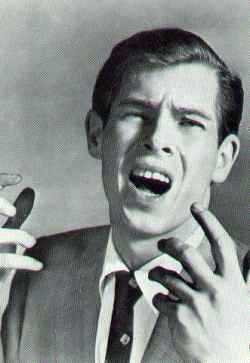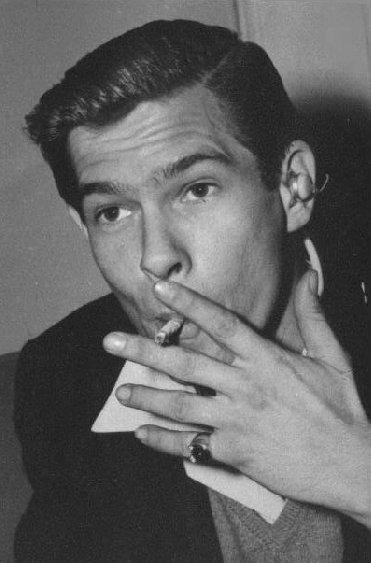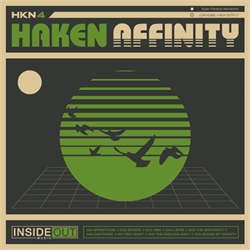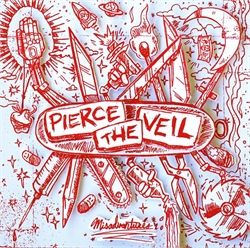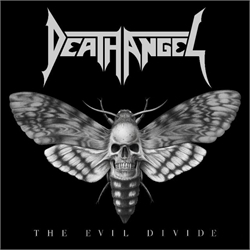Биография "Johnnie Ray"
<< Вернуться к списку всех песен "Johnnie Ray"
Johnnie Ray
Background information
Birth name John Alvin Ray
Born January 10, 1927
Hopewell, Oregon, USA
Died February 24, 1990 (aged 63)
Los Angeles, California, USA
Genre(s) Traditional pop music
Occupation(s) Singer, songwriter
Instrument(s) Vocals, piano
Years active 1951-1989
Label(s) OKeh Records
John Alvin Ray (January 10, 1927 – February 24, 1990) was an American singer, songwriter, and pianist. Popular for most of the 1950s, Ray has been cited by critics as a major precursor of what would become rock and roll, for his jazz and blues-influenced music and his animated stage persona.
Early life
Ray was born in Hopewell, Oregon, spending part of his childhood on a farm, eventually moving to Portland, Oregon. Ray was of Native American origin; his great-grandmother was a full-blooded Native American and his great-grandfather was Oregon pioneer George Kirby Gay of Berkeley, Gloucestershire, England.[citation needed] He became deaf in his right ear at age 13 after an accident during a Boy Scout event. It was his participation in the «blanket toss,» a sort of variation of the trampoline, that traumatized the youngster’s inner ear. Ray later performed wearing a hearing aid. Surgery performed in New York in 1958 left him almost completely deaf in both ears, although hearing aids helped his condition.
Career
Ray first attracted attention while performing at the Flame Showbar in Detroit, Michigan, an R&B nightclub. Inspired by rhythm singers like Kay Starr, LaVern Baker and Ivory Joe Hunter, Ray developed a unique rhythm based style, described as alternating between pre-rock R&B and a more conventional classic pop approach.
His first record, the self-penned R&B number for OKeh Records, «Whiskey and Gin», was a minor hit in 1951. The following year he dominated the charts with the double-sided hit single of «Cry» and «The Little White Cloud That Cried». Selling over two million copies of the 45 single, Ray’s delivery struck a chord with teenagers and he quickly became a teen idol.
Ray’s performing style included theatrics later associated with rock ‘n roll, including beating up his piano, writhing on the floor and crying.[citation needed] Ray quickly earned the nicknames, «Mr. Emotion», «The Nabob of Sob», and «The Prince of Wails», and several others.
More hits followed, including «Please Mr. Sun», «Such a Night», «Walkin’ My Baby Back Home», «A Sinner Am I», and «Yes Tonight Josephine». His last hit was «Just Walkin’ in the Rain», in 1956. He did, however, hit again in 1957 with «You Don’t Owe Me a Thing», which reached #10 in the Billboard charts. He was popular in the United Kingdom, breaking the record at the London Palladium formerly set by Frankie Laine. In later years, he retained a loyal fan base overseas, particularly in Australia.
Later career influences
Ray had a close relationship with journalist and television game show panelist Dorothy Kilgallen who gave a boost to his sagging career during his engagement at the Tropicana Resort & Casino in Las Vegas, Nevada in 1965.
In early 1969, Ray befriended Judy Garland, performing as her opening act during her last concerts in Copenhagen, Denmark and Malmo, Sweden. Ray was also the best man during Garland’s wedding to nightclub manager Mickey Deans in London.
Ray’s American career revived in the early 1970s, with appearances on The Andy Williams Show in 1970 and The Tonight Show Starring Johnny Carson three times during 1972 and 1973. His personal manager Bill Franklin resigned in 1976 and cut off contact with the singer a few years later. His American revival turned out to be shortlived. He performed in small American venues such as El Camino College in 1987.[5] Australian, English and Scottish promoters booked him for their large venues as late as 1989, his last year of performing.
Some writers suggested that the reason American entertainment bookers and songwriters ignored him in the 1980s was because they simply did not know who he was, or what his sound was like.[6] His exposure during the new era of cable television was limited to a few seconds in Dexys Midnight Runners’ 1982 music video for «Come On Eileen», using archival footage of Ray from 1954. He was name checked in the lyrics to «Come On Eileen» (viz «Poor old Johnnie Ray sounded sad upon the radio / he moved a million hearts in mono»).
His other video appearance was in Billy Idol’s 1986 «Don’t Need a Gun», in which Ray appeared on-camera.
Personal life
Ray had issues surface regarding his sexuality several times in his career, including two arrests for soliciting men for sex. Ray quietly pleaded guilty and paid a fine after the first arrest, in the restroom of the Stone Theatre burlesque house in Detroit, which was just prior to the release of his first record in 1951.[8] Ray went to trial following the second arrest in 1959, also in Detroit, for soliciting an undercover officer in one of the city’s gay bars. He was found not guilty.[8]
Despite these issues, Ray married Marilyn Morrison a short time after he gave his first New York concert, which was at the Copacabana in 1952. The wedding ceremony, attended by New York mayor Vincent R. Impellitteri, made the cover of the New York Daily News.[9] Morrison, the daughter of a Los Angeles nightclub owner,[9] was aware of the singer’s sexuality from the start, telling a friend she would «straighten it out.»[8] The couple separated in 1953 and divorced in 1954.
In the years hence, writers have noted that the marriage occurred under false pretenses,[10] and that Ray had a long-term relationship with his manager, Bill Franklin. Ray also had a relationship with columnist Dorothy Kilgallen, whom he met following an appearance on What’s My Line? in 1956.Kilgallen was a strong support for Ray during the 1959 solicitation trial.
Ray drank regularly and his alcoholism caught up with him in 1960, when he was hospitalized for tuberculosis. He recovered but continued drinking, and was diagnosed with cirrhosis at age fifty.
On 24 February 1990, Ray died of liver failure at Cedars-Sinai Hospital in Los Angeles. He is buried at Hopewell Cemetery near Hopewell, Oregon.
For his contribution to the recording industry, Johnnie Ray has a star on the Hollywood Walk of Fame at 6201 Hollywood Boulevard.
Partial discography
1951
«Cry» (with The Four Lads), Columbia 30th St Studio, NYC,
October 16, 1951; Mundell Lowe (g) Ed Safranski (b) Ed
Shaughnessy (d) Buddy Reed (p)
«Give Me Time» (with The Four Lads)
«(Here Am I) Brokenhearted» (with The Four Lads)
«The Little White Cloud That Cried», Columbia 30th St Studio,
NYC, October 15, 1951; Mundell Lowe (g) Ed Safranski
(b) Ed Shaughnessy (d) Stan Freeman (p) Lucky Thompson (sax)
«She Didn’t Say Nothin’ At All»
«Tell The Lady I Said Goodbye»
«Whiskey And Gin»
1952
«All of Me»
«A Sinner Am I»
«Candy Lips» (with Doris Day)
«Coffee and Cigarettes (Think It Over)» (with The Four Lads)
«Don’t Blame Me»
«Faith Can Move Mountains» (with The Four Lads)
«Let’s Walk That-A-Way» (with Doris Day)
«Mountains in the Moonlight»
«Out in the Cold Again»
«Please Mr. Sun» (with The Four Lads)
«The Lady Drinks Champagne»
«Walkin’ My Baby Back Home»
1953
«Full Time Job» (with Doris Day)
«Ma Says, Pa Says» (with Doris Day)
«Somebody Stole My Gal»
1954
«Alexander’s Ragtime Band»
«As Time Goes By»
«Going-Going-Gone»
«Hernando’s Hideaway»
«Hey There»
«If You Believe»
«Such a Night»
1955
«Flip Flop and Fly»
«I’ve Got So Many Million Years»
«Paths of Paradise»
«Song of the Dreamer»
1956
«Ain’t Misbehavin’»
«Everyday I Have The Blues»
«How Long How Long Blues»
«I Want To Be Loved»
«I’ll Never Be Free»
«I’m Gonna Move To the Outskirts of Town»
«Just Walkin’ in the Rain»
«Lotus Blossom»
«Sent For You Yesterday»
«Shake a Hand»
«Who’s Sorry Now»
1957
«Build Your Love (On a Strong Foundation)»
«Good Evening Friends» (with Frankie Laine)
«Look Homeward Angel»
«Should I?»
«Soliloquy Of a Fool»
«Street Of Memories»
«Up Above My Head» (with Frankie Laine)
«You Don’t Owe Me a Thing»
«Yes Tonight Josephine»
1958
«I’m Beginning to See the Light»
«I’m Confessin’»
«The Lonely Ones»
«Up Until Now»
1959
«Cool Water»
«Empty Saddles»
«I’ll Never Fall in Love Again»
«It’s All in the Game»
«Red River Valley»
«Twilight On the Trail»
«Wagon Wheels»
«When It’s Springtime in the Rockies»
1960
«I’ll Make You Mine»
1961
«Lookout Chattanooga»
Filmography
Actor — Year— Film— Role— Other notes
1954 There’s No Business Like Show Business Steve Donahue
1955 General Electric Theater Johnny Pulaski episode «The Big Shot»
Shower of Stars Himself episode «That’s Life»
1968 Rogues’ Gallery Himself
Television appearances
Year Film Role Other notes
1953 The Jack Benny Program Himself Episode «Johnnie Ray Show»
1953-1959 Toast of the Town Himself 7 episodes, 1953-1959
1954 The Colgate Comedy Hour Himself — singer 1 episode
1956 The Jimmy Durante Show Himself — singer as Johnny Ray
Val Parnell’s Sunday Night at the London Palladium Himself — Singer — Top Of The Bill 2 episodes, 1955-1960
Shower of Stars Himself
Frankie Laine Time Himself
1957 The Jackie Gleason Show Himself — Guest Host
What’s My Line? Himself — Mystery guest 2 episodes, 1955, 1957
1959 Johnnie Ray Sings Himself — Singer/Host Special
1963 Bandstand Himself
1968 The Hollywood Palace Himself — Singer
The Joey Bishop Show Himself Episode dated 25 January 1968
Frost on Sunday Himself Episode dated 8 December 1968
1970 The Andy Williams Show Himself Episode dated 10 October 1970
1972-1973 The Tonight Show Starring Johnny Carson Himself 3 episodes
1977 American Bandstand’s 25th Anniversary Himself
Fall In, the Stars Himself
The Merv Griffin Show Himself Episode dated 21 September 1977
1979 Juke Box Saturday Night Himself (1979)
1979-1980 CHiPs Himself 2 episodes, uncredited
Further reading
Guinness (2003). Guinness Book of British Hit Singles (16th Edition ed.). London: Gullane. ISBN 085112190X.
Rice, Jo (1982). The Guinness Book of 500 Number One Hits. Enfield, Middlesex: Guinness Superlatives. ISBN 0851122507.
Background information
Birth name John Alvin Ray
Born January 10, 1927
Hopewell, Oregon, USA
Died February 24, 1990 (aged 63)
Los Angeles, California, USA
Genre(s) Traditional pop music
Occupation(s) Singer, songwriter
Instrument(s) Vocals, piano
Years active 1951-1989
Label(s) OKeh Records
John Alvin Ray (January 10, 1927 – February 24, 1990) was an American singer, songwriter, and pianist. Popular for most of the 1950s, Ray has been cited by critics as a major precursor of what would become rock and roll, for his jazz and blues-influenced music and his animated stage persona.
Early life
Ray was born in Hopewell, Oregon, spending part of his childhood on a farm, eventually moving to Portland, Oregon. Ray was of Native American origin; his great-grandmother was a full-blooded Native American and his great-grandfather was Oregon pioneer George Kirby Gay of Berkeley, Gloucestershire, England.[citation needed] He became deaf in his right ear at age 13 after an accident during a Boy Scout event. It was his participation in the «blanket toss,» a sort of variation of the trampoline, that traumatized the youngster’s inner ear. Ray later performed wearing a hearing aid. Surgery performed in New York in 1958 left him almost completely deaf in both ears, although hearing aids helped his condition.
Career
Ray first attracted attention while performing at the Flame Showbar in Detroit, Michigan, an R&B nightclub. Inspired by rhythm singers like Kay Starr, LaVern Baker and Ivory Joe Hunter, Ray developed a unique rhythm based style, described as alternating between pre-rock R&B and a more conventional classic pop approach.
His first record, the self-penned R&B number for OKeh Records, «Whiskey and Gin», was a minor hit in 1951. The following year he dominated the charts with the double-sided hit single of «Cry» and «The Little White Cloud That Cried». Selling over two million copies of the 45 single, Ray’s delivery struck a chord with teenagers and he quickly became a teen idol.
Ray’s performing style included theatrics later associated with rock ‘n roll, including beating up his piano, writhing on the floor and crying.[citation needed] Ray quickly earned the nicknames, «Mr. Emotion», «The Nabob of Sob», and «The Prince of Wails», and several others.
More hits followed, including «Please Mr. Sun», «Such a Night», «Walkin’ My Baby Back Home», «A Sinner Am I», and «Yes Tonight Josephine». His last hit was «Just Walkin’ in the Rain», in 1956. He did, however, hit again in 1957 with «You Don’t Owe Me a Thing», which reached #10 in the Billboard charts. He was popular in the United Kingdom, breaking the record at the London Palladium formerly set by Frankie Laine. In later years, he retained a loyal fan base overseas, particularly in Australia.
Later career influences
Ray had a close relationship with journalist and television game show panelist Dorothy Kilgallen who gave a boost to his sagging career during his engagement at the Tropicana Resort & Casino in Las Vegas, Nevada in 1965.
In early 1969, Ray befriended Judy Garland, performing as her opening act during her last concerts in Copenhagen, Denmark and Malmo, Sweden. Ray was also the best man during Garland’s wedding to nightclub manager Mickey Deans in London.
Ray’s American career revived in the early 1970s, with appearances on The Andy Williams Show in 1970 and The Tonight Show Starring Johnny Carson three times during 1972 and 1973. His personal manager Bill Franklin resigned in 1976 and cut off contact with the singer a few years later. His American revival turned out to be shortlived. He performed in small American venues such as El Camino College in 1987.[5] Australian, English and Scottish promoters booked him for their large venues as late as 1989, his last year of performing.
Some writers suggested that the reason American entertainment bookers and songwriters ignored him in the 1980s was because they simply did not know who he was, or what his sound was like.[6] His exposure during the new era of cable television was limited to a few seconds in Dexys Midnight Runners’ 1982 music video for «Come On Eileen», using archival footage of Ray from 1954. He was name checked in the lyrics to «Come On Eileen» (viz «Poor old Johnnie Ray sounded sad upon the radio / he moved a million hearts in mono»).
His other video appearance was in Billy Idol’s 1986 «Don’t Need a Gun», in which Ray appeared on-camera.
Personal life
Ray had issues surface regarding his sexuality several times in his career, including two arrests for soliciting men for sex. Ray quietly pleaded guilty and paid a fine after the first arrest, in the restroom of the Stone Theatre burlesque house in Detroit, which was just prior to the release of his first record in 1951.[8] Ray went to trial following the second arrest in 1959, also in Detroit, for soliciting an undercover officer in one of the city’s gay bars. He was found not guilty.[8]
Despite these issues, Ray married Marilyn Morrison a short time after he gave his first New York concert, which was at the Copacabana in 1952. The wedding ceremony, attended by New York mayor Vincent R. Impellitteri, made the cover of the New York Daily News.[9] Morrison, the daughter of a Los Angeles nightclub owner,[9] was aware of the singer’s sexuality from the start, telling a friend she would «straighten it out.»[8] The couple separated in 1953 and divorced in 1954.
In the years hence, writers have noted that the marriage occurred under false pretenses,[10] and that Ray had a long-term relationship with his manager, Bill Franklin. Ray also had a relationship with columnist Dorothy Kilgallen, whom he met following an appearance on What’s My Line? in 1956.Kilgallen was a strong support for Ray during the 1959 solicitation trial.
Ray drank regularly and his alcoholism caught up with him in 1960, when he was hospitalized for tuberculosis. He recovered but continued drinking, and was diagnosed with cirrhosis at age fifty.
On 24 February 1990, Ray died of liver failure at Cedars-Sinai Hospital in Los Angeles. He is buried at Hopewell Cemetery near Hopewell, Oregon.
For his contribution to the recording industry, Johnnie Ray has a star on the Hollywood Walk of Fame at 6201 Hollywood Boulevard.
Partial discography
1951
«Cry» (with The Four Lads), Columbia 30th St Studio, NYC,
October 16, 1951; Mundell Lowe (g) Ed Safranski (b) Ed
Shaughnessy (d) Buddy Reed (p)
«Give Me Time» (with The Four Lads)
«(Here Am I) Brokenhearted» (with The Four Lads)
«The Little White Cloud That Cried», Columbia 30th St Studio,
NYC, October 15, 1951; Mundell Lowe (g) Ed Safranski
(b) Ed Shaughnessy (d) Stan Freeman (p) Lucky Thompson (sax)
«She Didn’t Say Nothin’ At All»
«Tell The Lady I Said Goodbye»
«Whiskey And Gin»
1952
«All of Me»
«A Sinner Am I»
«Candy Lips» (with Doris Day)
«Coffee and Cigarettes (Think It Over)» (with The Four Lads)
«Don’t Blame Me»
«Faith Can Move Mountains» (with The Four Lads)
«Let’s Walk That-A-Way» (with Doris Day)
«Mountains in the Moonlight»
«Out in the Cold Again»
«Please Mr. Sun» (with The Four Lads)
«The Lady Drinks Champagne»
«Walkin’ My Baby Back Home»
1953
«Full Time Job» (with Doris Day)
«Ma Says, Pa Says» (with Doris Day)
«Somebody Stole My Gal»
1954
«Alexander’s Ragtime Band»
«As Time Goes By»
«Going-Going-Gone»
«Hernando’s Hideaway»
«Hey There»
«If You Believe»
«Such a Night»
1955
«Flip Flop and Fly»
«I’ve Got So Many Million Years»
«Paths of Paradise»
«Song of the Dreamer»
1956
«Ain’t Misbehavin’»
«Everyday I Have The Blues»
«How Long How Long Blues»
«I Want To Be Loved»
«I’ll Never Be Free»
«I’m Gonna Move To the Outskirts of Town»
«Just Walkin’ in the Rain»
«Lotus Blossom»
«Sent For You Yesterday»
«Shake a Hand»
«Who’s Sorry Now»
1957
«Build Your Love (On a Strong Foundation)»
«Good Evening Friends» (with Frankie Laine)
«Look Homeward Angel»
«Should I?»
«Soliloquy Of a Fool»
«Street Of Memories»
«Up Above My Head» (with Frankie Laine)
«You Don’t Owe Me a Thing»
«Yes Tonight Josephine»
1958
«I’m Beginning to See the Light»
«I’m Confessin’»
«The Lonely Ones»
«Up Until Now»
1959
«Cool Water»
«Empty Saddles»
«I’ll Never Fall in Love Again»
«It’s All in the Game»
«Red River Valley»
«Twilight On the Trail»
«Wagon Wheels»
«When It’s Springtime in the Rockies»
1960
«I’ll Make You Mine»
1961
«Lookout Chattanooga»
Filmography
Actor — Year— Film— Role— Other notes
1954 There’s No Business Like Show Business Steve Donahue
1955 General Electric Theater Johnny Pulaski episode «The Big Shot»
Shower of Stars Himself episode «That’s Life»
1968 Rogues’ Gallery Himself
Television appearances
Year Film Role Other notes
1953 The Jack Benny Program Himself Episode «Johnnie Ray Show»
1953-1959 Toast of the Town Himself 7 episodes, 1953-1959
1954 The Colgate Comedy Hour Himself — singer 1 episode
1956 The Jimmy Durante Show Himself — singer as Johnny Ray
Val Parnell’s Sunday Night at the London Palladium Himself — Singer — Top Of The Bill 2 episodes, 1955-1960
Shower of Stars Himself
Frankie Laine Time Himself
1957 The Jackie Gleason Show Himself — Guest Host
What’s My Line? Himself — Mystery guest 2 episodes, 1955, 1957
1959 Johnnie Ray Sings Himself — Singer/Host Special
1963 Bandstand Himself
1968 The Hollywood Palace Himself — Singer
The Joey Bishop Show Himself Episode dated 25 January 1968
Frost on Sunday Himself Episode dated 8 December 1968
1970 The Andy Williams Show Himself Episode dated 10 October 1970
1972-1973 The Tonight Show Starring Johnny Carson Himself 3 episodes
1977 American Bandstand’s 25th Anniversary Himself
Fall In, the Stars Himself
The Merv Griffin Show Himself Episode dated 21 September 1977
1979 Juke Box Saturday Night Himself (1979)
1979-1980 CHiPs Himself 2 episodes, uncredited
Further reading
Guinness (2003). Guinness Book of British Hit Singles (16th Edition ed.). London: Gullane. ISBN 085112190X.
Rice, Jo (1982). The Guinness Book of 500 Number One Hits. Enfield, Middlesex: Guinness Superlatives. ISBN 0851122507.


